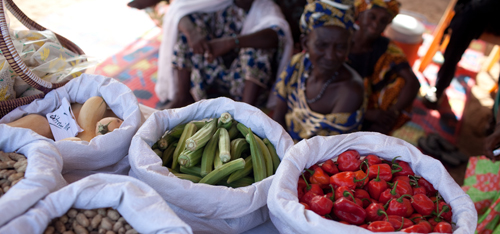Product marketing and quality
The Integrated Production and Pest Management (IPPM) programme in West Africa aims at promoting the production of quality food and improve its marketing to contribute to the income generation of smallholder farmers and the reduction of their vulnerability.
The quality and marketing of agricultural products are essential aspects, particularly in vegetable production. Production is not viable without the marketing of these products, and producers often face serious problems when it comes to selling their produce. Moreover, with a growing population in West Africa, increased efforts are required to reduce chemical contamination due to the use of harmful pesticides and raise awareness of the biological and physical hazards, so that farmers can produce nutritious and safe food.
Since 2008, IPPM has been supporting activities in vegetable marketing and quality, primarily targeting local and sub-regional markets of the vegetable sector. These activities focus on the capacity building of farmers, producer groups and farmer field school (FFS) facilitators, and are based on three pillars:
- improving the commercial safety and quality of horticultural products;
- production organization and planning;
- research and trading markets, and group-marketing.
The themes have been piloted in IPPM trainings in Burkina Faso, Mali and Senegal. As a result, two training modules (COQUA1 and COQUA2) have been developed, tested and approved by producers. The modules have now been introduced into the IPPM FFS curricula to raise the awareness of the participating farmers, on marketing and food quality issues for vegetables. A specific guide for facilitators illustrating these aspects is also being developed. The modules are increasingly being used by a wider audience in Benin, Guinea, Mauritania and Niger, within other programmes and by other agencies.
From 2008 to 2012, the IPPM programme implemented 217 individual FFS that included the COQUA modules, which benefited 138 farmers’ organizations and trained a total of 17 master trainers, 155 facilitators and 5 500 smallholder producers – 70 percent of whom were women.
Below is a list of past or current projects of the IPPM programme where the COQUA modules have been used:
- All ACP Agricultural Commodities Programme, including cotton (regional)
- Initiative to boost rice production in West Africa (regional)
- Supporting competitiveness and sustainable intensification of African cotton sectors through capacity development on IPPM (regional)
- Integrated Production and Protection Management in West Africa (regional)
- Integrating climate resilience into agricultural production for food security in rural areas of Mali (national)
- Food security in Senegal (national)

